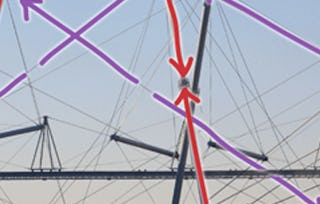This course deals with compression. When we push an object, it compresses. Compression is what's going to hold up our building. Arches, vaults, domes, and anti-funicular forms help resist compression. In this course, you will learn about different columns and arches and their role in resisting compression. You'll also build anti-funicular forms. The first module introduces you to the topic compression and familiarizes you with the key terms related to compression. The second module deals with topics such as columns, arches, and other anti-funicular forms. It explores their roles in resisting compression. The final module explores how to build anti-funicular forms.

Engineering of Structures: Compression

Engineering of Structures: Compression
This course is part of The Engineering of Structures Around Us Specialization

Instructor: Vicki May
2,456 already enrolled
Included with
28 reviews
Recommended experience
What you'll learn
Define compression
Identify the definitions of the key glossary terms related to compression
Recognize the role of a column in resisting compression
Recognize the role of an arch in resisting compression
Skills you'll gain
- Materials science
- Construction
- Structural Analysis
- Mechanics
- Engineering Design Process
- Architectural Engineering
- Engineering Analysis
- Structural Engineering
- Civil Engineering
- Building Design
- Skills section collapsed. Showing 9 of 10 skills.
Details to know

Add to your LinkedIn profile
17 assignments
See how employees at top companies are mastering in-demand skills

Build your subject-matter expertise
- Learn new concepts from industry experts
- Gain a foundational understanding of a subject or tool
- Develop job-relevant skills with hands-on projects
- Earn a shareable career certificate

There are 3 modules in this course
This module introduces you to the topic compression.
What's included
3 videos9 readings2 assignments
This module explores compression in details. It deals with topics such as columns, arches, and other anti-funicular forms. It explores their roles in resisting compression.
What's included
9 videos14 readings11 assignments2 plugins
This module explores how to build anti-funicular forms.
What's included
1 video4 readings4 assignments3 discussion prompts
Earn a career certificate
Add this credential to your LinkedIn profile, resume, or CV. Share it on social media and in your performance review.
Instructor

Offered by
Explore more from Mechanical Engineering
 Status: Free Trial
Status: Free TrialDartmouth College
 Status: Free Trial
Status: Free TrialDartmouth College
 Status: Free Trial
Status: Free TrialDartmouth College
 Status: Free Trial
Status: Free TrialDartmouth College
Why people choose Coursera for their career

Felipe M.

Jennifer J.

Larry W.

Chaitanya A.
Learner reviews
- 5 stars
92.85%
- 4 stars
3.57%
- 3 stars
0%
- 2 stars
0%
- 1 star
3.57%
Showing 3 of 28
Reviewed on Mar 18, 2025
The professor really explained well . i think slender ratio should be added in this course.
Reviewed on Jan 21, 2025
Professor Vicki was great at explaining all the concepts
Reviewed on Sep 18, 2024
The course was really helpful. The numericals involve practical examples, while the explanations and demonstration of key concepts are amazing.

Open new doors with Coursera Plus
Unlimited access to 10,000+ world-class courses, hands-on projects, and job-ready certificate programs - all included in your subscription
Advance your career with an online degree
Earn a degree from world-class universities - 100% online
Join over 3,400 global companies that choose Coursera for Business
Upskill your employees to excel in the digital economy
Frequently asked questions
To access the course materials, assignments and to earn a Certificate, you will need to purchase the Certificate experience when you enroll in a course. You can try a Free Trial instead, or apply for Financial Aid. The course may offer 'Full Course, No Certificate' instead. This option lets you see all course materials, submit required assessments, and get a final grade. This also means that you will not be able to purchase a Certificate experience.
When you enroll in the course, you get access to all of the courses in the Specialization, and you earn a certificate when you complete the work. Your electronic Certificate will be added to your Accomplishments page - from there, you can print your Certificate or add it to your LinkedIn profile.
Yes. In select learning programs, you can apply for financial aid or a scholarship if you can’t afford the enrollment fee. If fin aid or scholarship is available for your learning program selection, you’ll find a link to apply on the description page.
More questions
Financial aid available,

